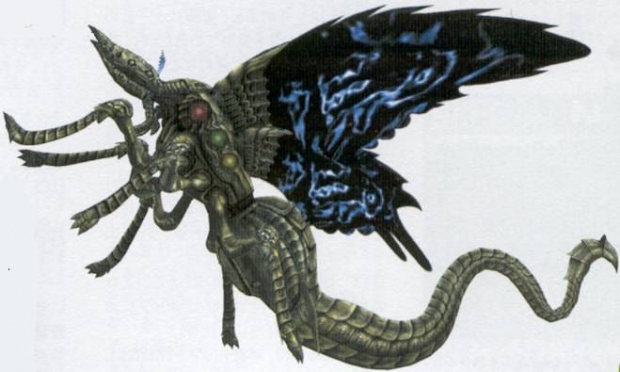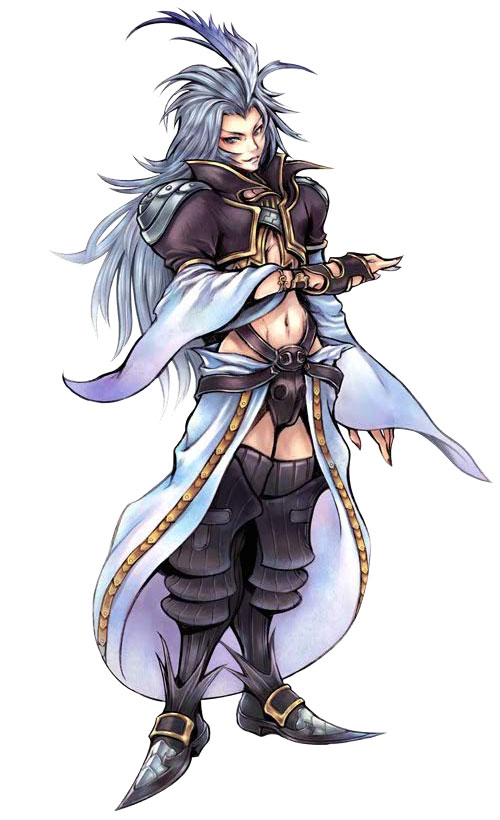This is the WORLD where I write my musing about manga/anime/video games and make comments on certain aspects. It's just a little something to stir up a conversation so please don't take me TOO seriously on the things I write here. I'd love to hear your opinion so feel free to comment.
- Created By red:leaf
Correlation
After playing the ending of Final Fantasy X-2 for the third time, I feel that there are some really strange correlations between this game and Final Fantasy VII....
WARNING: The following content may or may not contain spoilers for the videogames Final Fantasy X-2 and Final Fantasy VII. Read at your own disgression.
First off, there's this scene in ch. 5 of FFX-2 where you talk to Shinra and he says he's analyzing the energy of the Farplane. He describes it being limitless and a source of life for all of Spira. Wow, Lifestream, anyone? Shinra goes on to say that the energy from the Farplane could power a city just like Zanarkand. Actually, when I watched this scene I thought immediately of that theory that the Ivalice in the FF games is all the same Ivalice and a good chunk of the FF games are connected to each other. I seriously doubt that Spira and whatever the planet is called in FFVII are the same thing though.
Secondly, at the final battle of FFX-2, when Lenne's spirit is finally able to talk to Shuyin, Shuyin says, "But I wasn't able to save you." Lenne replies, "That doesn't matter." Granted, this game was released before Advent Children so whoever wrote AC definitely could have drawn on this scene for inspiration. The correlation just seems a bit creepy, especially since almost those exact lines are said by Cloud and Aerith. Cloud, if you had died after Aerith's death, would you have ended up like Shuyin? I sort of doubt it but it's always a possibility, I guess.
I've also decided that Vegnagun looks like a giant moth. Sort of a weird design for a final boss. Maybe a Godzilla homage? Still weird.

Villians
So I was watching cutscenes for Final Fantasy IX the other day and reading people's comments and everyone's like, "Kuja is way more bad-ass than Sephiroth!" I'll agree he's a creeper but I never really thought about how well he rates on the "evilness scale," if you will. Someone else wrote that Sephiroth is overrated because all he could ever do was TRY to blow up a planet through the entire game but Kuja did blow up a planet in a matter of moments. I've got to hand it to Kuja--he did blow Sephiroth out of the water on that point. I guess his looks are deceiving.
Have to say though--his design for Dissidia looks pretty good.

Cheesy Lines
For Earth Day this year, since Anime Club is also on Thursdays, we decided to watch Origins: Spirits of the Past. It's a pretty good movie but what sort of ruined it for me was the incredibly cheesy lines peppered throughout. It's the short of cheesy you either snort at or bark laughter. I've been noticing these incredibly cheesy lines in other things too, like Odin Sphere (videogame).
Anyway, I got to thinking about what exactly makes something cheesy? I mean, besides poor writing (no offense, anyone). But I really don't think that poor writing is the whole thing here. I think it's partially an auditory response. Let me ellaborate.
If you watch an anime in your native language, you pay a lot closer attention to what people are saying because...well you have to know what's going on, unless you've got subtitles going on or something. So what characters are saying in such and such words is very clear to you. Now, if you are watching an anime that is subbed, in a different language that your native one, that auditory response is gone and you are now relying entirely on visual communication. There is a disconnect between what you are hearing and what you are seeing. The words are direct but to some extent, there isn't much of a auditory context, except maybe the tone of voice. Likewise, the tone of voice is all you've got to listen to but the words might as well be gibberish. Therefore, since there is a disconnect between auditory and visual, dialogue sounds and appears less tacky than it would appear if both were in a native tongue.
Ung, I don't know if this is making any sense. I'm rambling. Give me a shout out if this is still confusing and I'll try to be more clear when I add more to this argument.
FF9 Musing
Like I promised, a FF9 musing. It's very short but really, there's not much that needs to be mulled over in that game.
WARNING: The following content may contail spoilers for the game Final Fantasy IX. Read at your own disgretion.
The game is actually pretty self explanitory. There's only one thing that's bothered me ever since I've played it.
In Memoria, towards the end, your party crosses a bridge and below there is a door/dock and moored there is a boat with (I think) a child crying and a dead person. Dagger comes out and says she thinks that it is her, when she was found with her dead mother as a child. She exits the screen and leaves Zidane alone. Then Garland comes in (telepathically) and says that it wasn't Dagger's memory that was being shown, it was Zidane's.
Wait....What?
I figure it could go two ways. 1) the child is actually Zidane and not Dagger. 2) Zidane is actually seeing Dagger as a child when she is found. Neither really are very satisfactory. If theory 1 is correct, who is the dead person? Or is it perhaps Kuja? Or Garland? If theory 2 is correct, how could Zidane forget something like that and why would he be in the area at the time of her arrival? There's no real answer in the game, and if there is, I've obviously missed it.
I'd love to hear any thoughts or theories on the matter, so feel free!
EDIT: So, playing that game for the third time or so, I think I've finally solved this mystery. Basically, Memoria is this large set up for the final plot line, you could say. At the end of the game, you are supposed to save the Crystal from destruction via Necron. What is this Crystal? Why, it's the crystal of life. As I figure it, the Crystal is sort of a collective memory of life and also seems to keep the cycle of life going. That's why when you reach the one room that's an ocean everyone's like, "Gaia started out as an ocean. How do I know that? And how do you know that too?"
So, in the end, does that make Memoria and the final battle rather jarring? Definitely. And make Necron a completely random bad guy? Yes indeed. But everything works out because the defense of life and the idea of collective memory and that even when a person dies, they live on in memory, fits in very nicely with the overall message of the game.